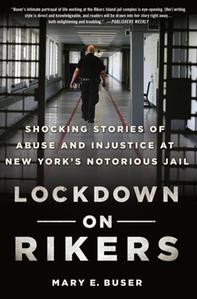
Mary E. Buser worked in the Mental Health department on Rikers Island from 1995 to 2000 during New York City Mayor Rudolph Giulani's historic crackdown on crime. She eventually oversaw the mental health of prisoners interned in the Central Punitive Segregation Unit, a facility designed to place dangerous criminals in solitary confinement. Her experiences there helped inspire her memoir, Lockdown on Rikers: Shocking Stories of Abuse and Injustice at New York's Notorious Jail (see our review below).
Your period of employment at Rikers Island ended in 2000. What led you to publish 15 years later?
When I left Rikers in 2000, I was determined to tell the world everything I had witnessed behind bars. Little did I know the world was not particularly interested. Rudolph Giuliani was still in office and the city was celebrating historically low levels of crime. The last thing people cared about was the fate of those who'd been arrested. Nonetheless, I pressed on, convinced that if people really knew, they would definitely care.
But there was more to writing a book than I'd anticipated. Although I'd always been a decent writer, I'd never attempted anything book-length and turning out a quality manuscript took years. At times I considered a ghost writer, but in the end I felt that I was the only one who could tell this story. Between working on the manuscript and trying to attract an agent, the years went by. As the rejections piled up, there were many discouraging moments, believe me. But I could never forget the faces of the people I'd met, and the stories that needed to be told, so I kept going, waiting for my opening. I never anticipated that it would be over 10 years before the opening came, but now that it has, I'm actually grateful for the timing.
The book is being released at a time of public scrutiny of our criminal justice system--with growing concerns about mass incarceration, solitary confinement, and treatment of the incarcerated mentally ill. With this heightened interest comes the potential for maximal impact of my story. Prior to the recent media explosion depicting the injustice and brutality on Rikers Island, I had a fear that no one would believe what I was saying. Now, there is no cause for doubt, and my story is that much stronger. I guess everything has its time.
 Your time at Rikers was profoundly influenced by the policies of then-mayor Giuliani. Many New Yorkers still regard his “tough on crime” approach as a success, but you report that it flooded Rikers' jails and left mental health workers overwhelmed. With the benefit of hindsight, how do you view the mayor's policies?
Your time at Rikers was profoundly influenced by the policies of then-mayor Giuliani. Many New Yorkers still regard his “tough on crime” approach as a success, but you report that it flooded Rikers' jails and left mental health workers overwhelmed. With the benefit of hindsight, how do you view the mayor's policies?
Giuliani's aggressive policing policies resulted in the biggest jailhouse build-up in New York City history. To put things in perspective, an upstate prison like Attica houses approximately 2,000 inmates in total. At the height of Giuliani's crackdown, 24,000 inmates were held on Rikers Island! His campaign cast a wide net, picking up not only dangerous criminals, but low-level offenders--trespassers, loiterers, and the homeless and mentally ill, whose crimes were often little more than petty mischief--people whose needs could have been humanely addressed on the outside, sparing them the trauma of incarceration. But under his regime, complex social problems had but one solution: arrest! To make matters worse, he simultaneously gutted the Rikers Social Services Department, virtually eliminating critical support for the "presumed innocent," and also severed ties with the respected 25-year inmate healthcare vendor, Montefiore Hospital. He then brought in a cheaper vendor with no experience in a correctional setting. The ensuing cutbacks inevitably resulted in diminished care, with terrible consequences for all, and in particular for the mentally ill.
While I would be the last person to argue against reduced crime and safer streets, I believe the same results could have been achieved with a more thoughtful and humane approach, rather than an ever bigger hammer.
As you mentioned, the publication of Lockdown on Rikers is very timely. Presidential candidates have spoken about the problem of mass incarceration and newspapers (especially New York newspapers) are filled with stories of prison abuse. Do you have any hope that prison reform is becoming more viable?
Yes, I do. When I was at Rikers, news stories about jails and prisons were few and far between, and when they appeared, they were barely noticed and promptly forgotten. Now, there is a sustained and unrelenting barrage of stories depicting guard-on-inmate brutality, the horrors of solitary confinement, treatment of the mentally ill, and the unfairness of the criminal justice system. I see a growing groundswell of outrage, which is already prompting change.
In New York City, a progressive corrections commissioner was installed, and he has already made significant reforms to solitary confinement on Rikers Island. As recently as a few years ago, this would have been unthinkable. In addition, the recently announced reforms to solitary confinement in the California prison system, largely brought about by the Pelican Bay hunger strikes, made national headlines. With world leaders, from President Obama to the Pope, voicing their concerns, I think we are at the beginning of historic changes to our criminal justice and penal systems.
In Lockdown on Rikers you explicitly equate solitary confinement with torture. Why do you think the general public remains untroubled by the practice?
I think a big factor is that solitary confinement is tucked away and out of sight. This punishment is carried out deep within the recesses of the already cutoff world of jails and prisons. The public never sees it up close. But even for those who might be troubled by it, I think a second reassuring factor is confidence in our criminal justice system, and an abiding trust in the constitutional prohibition of cruel and unusual punishment. It is almost unfathomable to consider that our constitution could be so egregiously violated. We are conditioned to believe that human rights violations occur elsewhere--never here. But if people were to see solitary confinement up close the way I did, I think they would be horrified, and would quickly realize that the 8th Amendment is absolutely being violated. --Hank Stephenson, bookseller, Flyleaf Books

